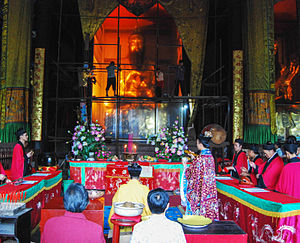Taoists
Taoism (), also known as Daoism, is a religious or philosophical tradition of Chinese origin which emphasizes living in harmony with the Tao (, literally "Way", also romanized as Dao). The Tao is a fundamental idea in most Chinese philosophical schools; in Taoism, however, it denotes the principle that is both the source, pattern and substance of everything that exists. Taoism differs from Confucianism by not emphasizing rigid rituals and social order. Taoist ethics vary depending on the particular school, but in general tend to emphasize wu wei (effortless action), "naturalness", simplicity, spontaneity, and the Three Treasures: jing (sperm/ovary energy, or the essence of the physical body), qi ("matter-energy" or "life force", including the thoughts and emotions), and shén (spirit or generative power).
The roots of Taoism go back at least to the 4th century BCE. Early Taoism drew its cosmological notions from the School of Yinyang (Naturalists), and was deeply influenced by one of the oldest texts of Chinese culture, the Yijing, which expounds a philosophical system about how to keep human behavior in accordance with the alternating cycles of nature. The Tao Te Ching, a compact book containing teachings attributed to Laozi (Chinese: 老子; pinyin: Lǎozǐ; Wade–Giles: Lao Tzu), is widely considered the keystone work of the Taoist tradition, together with the later writings of Zhuangzi.
...
Wikipedia

